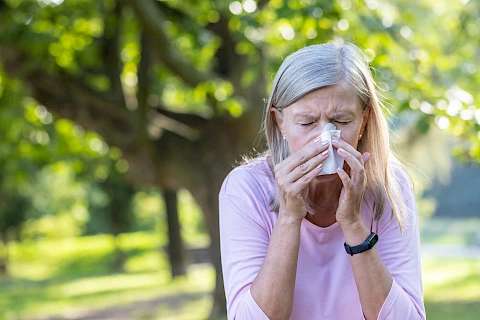
As we age, taking care of our health becomes increasingly crucial, and managing seasonal allergies is essential. For seniors, allergies can pose unique challenges, affecting overall well-being and quality of life. By understanding common allergens and how allergies manifest in seniors, you can take steps to minimize their impact.
Allergies in Seniors
In Northern Kentucky, common allergens include pollen, dust mites, and pet dander. Allergies may show up differently in seniors than in younger people. Aging can affect how the body responds to allergens, making diagnosis tricky. Seniors might not recognize their symptoms as allergy-related right away. Early recognition is key because ignoring symptoms can lead to complications.
Common Allergens and Symptoms
Pollen from blooming trees and plants affects many in our area. Dust mites, tiny creatures hiding in bedding and upholstered furniture, are another common allergen. Even beloved pets can trigger allergic reactions through their dander. For seniors, allergy symptoms often include more than just sneezing and itching. Respiratory issues like asthma can worsen; some may experience noticeable skin reactions. Another concern is that allergies can exacerbate existing health conditions like heart disease or diabetes. It's essential to pay attention to these signs and take them seriously.
Strategies for Minimizing Exposure
Minimizing allergen exposure at home and outdoors can significantly ease symptoms. Here are some practical tips:
- Keep windows closed during high pollen days to avoid letting allergens inside.
- Use air purifiers to help filter out dust and pollen from the home.
- Wash bedding frequently in hot water to reduce dust mites.
- Consider wearing a mask when gardening or spending time outdoors during pollen season.
Maintaining cleanliness in the living environment is crucial. Regular vacuuming and dusting help keep allergens at bay. Staying inside during peak pollen times, usually mid-morning, can reduce exposure.
Medication Options and Management
Various allergy medications are suitable for seniors. Antihistamines, decongestants, and nasal sprays are some options. Each has benefits and potential side effects, especially when mixed with other medications. It's vital to understand these interactions and consult with a healthcare provider.
A personalized allergy management plan can make a big difference. This plan should consider any other medications being used and particular health needs. Proper management not only alleviates symptoms but also improves overall health.
When to Consult a Healthcare Provider
Knowing when to seek medical advice is essential. A healthcare provider's input is valuable if allergy symptoms are severe, persistent, or affect daily life. Regular check-ups can help manage allergies effectively and catch early signs of complications.
Healthcare providers can offer allergy tests or suggest treatments tailored to individual needs. Professional advice for those with other chronic health conditions ensures that allergy treatments do not interfere with existing care plans.
Senior Helpers Northern Kentucky Can Help Seniors Manage Their Seasonal Allergies
Managing allergies in your senior years is about recognizing symptoms early, minimizing exposure, and choosing appropriate medications. Taking proactive steps can significantly improve the quality of life. Remember, if allergies make life uncomfortable, it's time to act.
Contact Senior Helpers Northern Kentucky today for personalized support and assistance in managing allergies and other senior care needs. By addressing allergies together, we can help ensure a healthier, more comfortable life for our cherished seniors in Northern Kentucky.